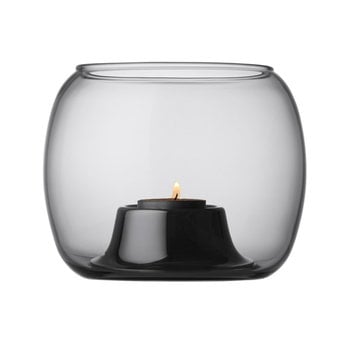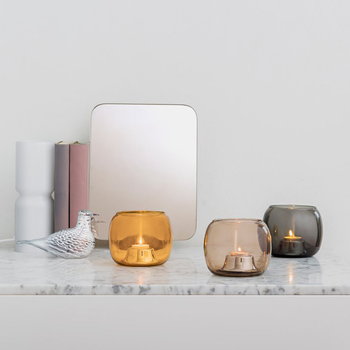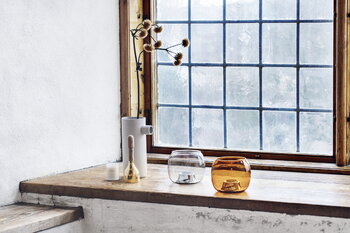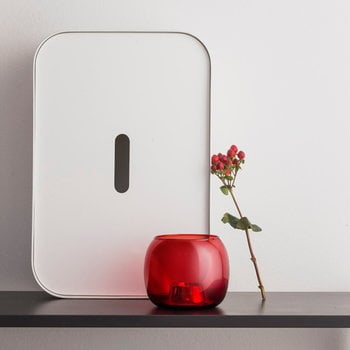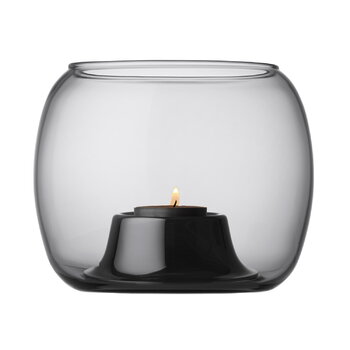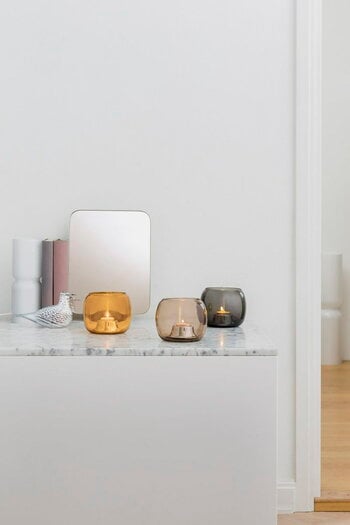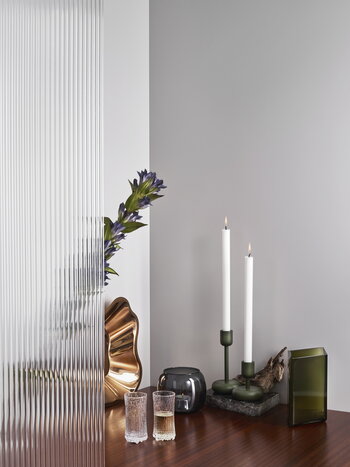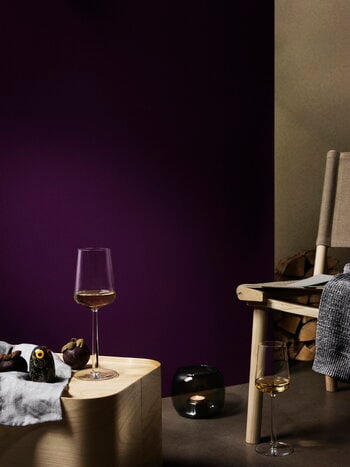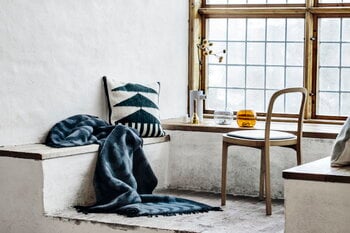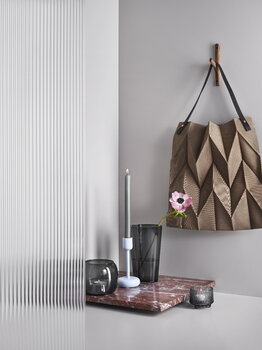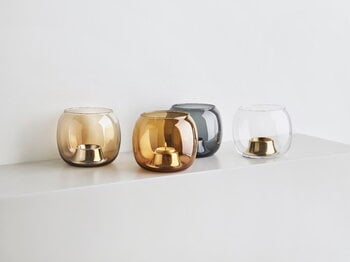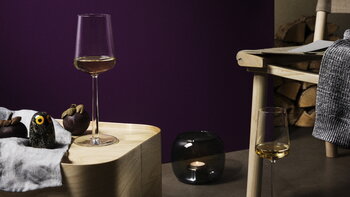Iittala’s Kaasa tealight candleholder, designed by Ilkka Suppanen, creates a soft and subtle glow around itself. Kaasa’s elegant, round globe is made of fine mouth-blown glass and the inner part is manufactured from stainless steel and given a polished finish. The candleholder is intended for tealights and indoor use only. Kaasa’s gentle light suits both everyday and special occasions.
Kaasa tealight holder, grey
Iittala
Description
Iittala’s Kaasa tealight candleholder, designed by Ilkka Suppanen, creates a soft and subtle glow around itself. Kaasa’s elegant, round globe is made of fine mouth-blown glass and the inner part is manufactured from stainless steel and given a polished finish. The candleholder is intended for tealights and indoor use only. Kaasa’s gentle light suits both everyday and special occasions.
Product details (4)
- Material
- Glass
- Colour
- Grey
- Size
- 14, 1 x 11.5 cm
- Care instructions
- Wsh by hand only
- Product ID
Designer
Ilkka Suppanen (born 1968) is a renowned Finnish designer and architect. He studied architecture at the Helsinki University of Technology and interior architecture and furniture design at the University of Arts and Design and completed his design studies at the Rietveld Academy, Amsterdam, in 1992. In 1995 he founded his design agency Studio Suppanen, which has provided strategic and integrated design services for international clients like Artek, Axis, Cappellini, Ferlea, Leucos, Lucente, Nokia, Zanotta, Marimekko, Saab Automobiles and many others.
In 1997, Ilkka Suppanen and his colleagues established the Snowcrash design collective, which received the Young Designer of the Year Award in Germany the same year – Snowcrash is considered one of the most prominent Finnish design groups of its era. Since then, Suppanen has been awarded with several other prestigious awards, including the Bruno Mathsson Award in 2006, Red Dot Best of the Best Award in 2012, the Söderberg Award in 2015 as well as the Finnish Kaj Franck Award in 2020, to name a few. He has also received the Good Design Award in 2008, 2017 and 2018.
In his work, Ilkka Suppanen emphasizes the added value design brings to the whole production chain from end-user requirements to finished products. Suppanen values long term projects that encompass innovation, as his interest in production techniques and using different materials is always present in his work. Suppanen’s expression is airy and forward-looking, but sustains with pride the classic Scandinavian design heritage. His designs are innovative and functional and at the same time have a strong aesthetic identity.
Ilkka Suppanen’s most famous designs include the Twiggy table for Woodnotes, the Everyday Holy mug created for Muuto, the Rosebud chair designed for Vivero and the Iittala Fireplace for which he received the prestigious Finnish Fennia Prize in 2009. Ilkka Suppanen’s work has been on display around the world in places like the Venice biennials, Milan Furniture Fair and MoMA in New York. His design works have been selected for the permanent collections of several major museums, including the Stedelijk Museum in Amsterdam and the Museum of Applied Art in Cologne.
View all productsReviews (1)
1
Based on 1 reviews
-
A
anonyymi
Neuss, Germany
Ostokset eivät ole vieläkään tullut! En tiedä missä ne viipyvät.
376 days ago
Sustainability
The Product Sustainability Framework, our criteria of sustainable design, helps you find the most sustainable products in our selection. Read below which sustainability criteria this product has met.
Working conditions & labour 8/9
-
Equal opportunities for all employees
-
Commitment to UN Global Compact, fair compensation for all employees
-
Corporate responsibility requirements defined and communicated for suppliers
-
Systematic work for improved inclusion and well-being in the workplace
-
Transparent supply chain
-
Suppliers' compliance to a code of conduct ensured
-
Compliance to the UN Guiding Principles on Business and Human Rights ensured in the supply chain
-
Support for community involvement in the supply chain
-
Direct suppliers audited and certified
Eco-friendly production 7/9
-
Fair and resource-wise water-use in production
-
No incineration or landfilling of returned items
-
No use of endangered species as materials
-
No direct environmental emissions or waste (excl. GHGs) from production
-
The sustainability of direct suppliers' production is addressed and monitored
-
Material-efficient and ecological packaging
-
Positive impact on nature’s well-being through operations that regenerate natural ecosystems
-
Production and material sourcing that respect biodiversity, animal rights, and natural ecosystems
-
No potentially harmful chemicals used in own production
Climate impact 5/8
-
Company's direct greenhouse gas emissions identified and commitment to reduction
-
Product's carbon impact identified and commitment to reduction
-
Guidance on energy- and eco-efficient use of the product
-
Contribution to climate initiatives beyond the brand’s direct operations
-
Low-carbon or compensated transportation
-
Carbon footprint of the product calculated and goals set to reduce it
-
100 % renewable energy in own production and operations
-
Carbon neutral or carbon negative product
Sustainable materials 4/6
-
Sustainable and long-lasting material choices
-
No harmful or hazardous substances
-
Responsible raw material sourcing and production
-
Ecological materials: natural, biodegradable, recyclable or recycled contents
-
Materials suited for circularity: monomaterials, recyclable finishings, renewable or recycled contents etc.
-
Outstanding materials in terms of innovativeness, responsibility, sustainability and circularity: local production or sourcing, 100 % recycled content, C2C-certification etc.
Circular design 3/5
-
High aesthetic quality promoting long-term use of the product
-
Technically durable product design and material choices
-
Design for enduring life-long quality
-
Design and support for product maintenance, repair and upgradability
-
Innovative circular design solutions: circular service system, resale platform, remanufacturing, collection of used products, etc.
